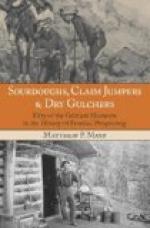“I did not address you, sir!” returned Bennington coldly. The Westerner’s eyes twinkled with amusement. The girl interrupted.
“Thank you very much, Mr. de Laney, but Mr. Fay is right—I wouldn’t trouble you.” Her eyes commanded Fay, and he moved a little apart.
“Don’t be angry,” she pleaded hurriedly, in an undertone, “but it’s better that way to-night. And I think you acted grandly.”
“You are the one who acted grandly,” he replied, a little mollified. “How can I ever thank you? You came just in time.”
She laughed.
“You’re not angry, are you?” she coaxed.
“No, of course not; what right have I to be?”
“I don’t like that—quite—but I suppose it will do. You’ll be there to-morrow?”
“You know I will.”
“Then good-night.” She gave his folded arm a hasty pat and ran on down the hill after Fay, who had gone on. Bennington saw her seize his shoulders, as she overtook him, and give them a severe shake.
The light of the torches down the gulch wavered and disappeared. Bennington returned to his room. On the table lay his manuscript, and the ink was hardly dried on the last word of it. Outside a poor-will began to utter its weird call. The candle before him sputtered, and burned again with a clear flame.
[Footnote A: Western—to become frightened.]
CHAPTER IX
THE HEAVENS OPENED
Bennington awoke early the next morning, a pleased glow of anticipation warming his heart, and almost before his eyes were opened he had raised himself to leap out of the bunk. Then with a disappointed sigh he sank back. On the roof fell the heavy patter of raindrops.
After a time he arose and pulled aside the curtains of a window. The nearer world was dripping; the farther world was hidden or obscured by long veils of rain, driven in ragged clouds before a west wind. Yesterday the leaves had waved lightly, the undergrowth of shrubs had uplifted in feathery airiness of texture, the ground beneath had been crisp and aromatic with pine needles. Now everything bore a drooping, sodden aspect which spoke rather of decay than of the life of spring. Even the chickens had wisely remained indoors, with the exception of a single bedraggled old rooster, whose melancholy appearance added another shade of gloom to the dismal outlook. The wind twisted his long tail feathers from side to side so energetically that, even as Bennington looked, the poor fowl, perforce, had to scud, careened from one side to the other, like a heavily-laden craft, into the shelter of his coop. The wind, left to its own devices, skittered across cold-looking little pools of water, and tried in vain to induce the soaked leaves of the autumn before to essay an aerial flight.




